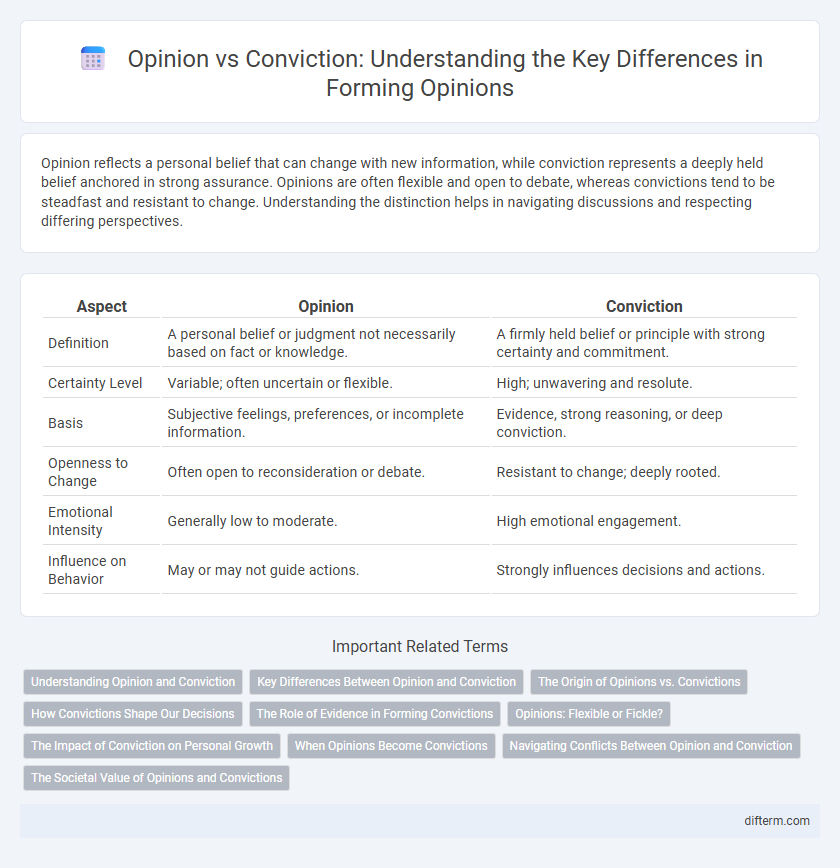Opinion reflects a personal belief that can change with new information, while conviction represents a deeply held belief anchored in strong assurance. Opinions are often flexible and open to debate, whereas convictions tend to be steadfast and resistant to change. Understanding the distinction helps in navigating discussions and respecting differing perspectives.
Table of Comparison
| Aspect | Opinion | Conviction |
|---|---|---|
| Definition | A personal belief or judgment not necessarily based on fact or knowledge. | A firmly held belief or principle with strong certainty and commitment. |
| Certainty Level | Variable; often uncertain or flexible. | High; unwavering and resolute. |
| Basis | Subjective feelings, preferences, or incomplete information. | Evidence, strong reasoning, or deep conviction. |
| Openness to Change | Often open to reconsideration or debate. | Resistant to change; deeply rooted. |
| Emotional Intensity | Generally low to moderate. | High emotional engagement. |
| Influence on Behavior | May or may not guide actions. | Strongly influences decisions and actions. |
Understanding Opinion and Conviction
Opinion reflects a person's subjective judgment shaped by experiences and information, often flexible and open to change. Conviction involves a strong, unwavering belief rooted in deeply held values or evidence, guiding consistent behavior and decision-making. Understanding the distinction between opinion and conviction helps clarify how individuals process information and commit to their perspectives.
Key Differences Between Opinion and Conviction
Opinion reflects a personal belief or judgment formed without absolute certainty, often influenced by emotions or incomplete information. Conviction embodies a firmly held belief, supported by strong evidence or moral certainty, guiding consistent actions and decisions. The key difference lies in the degree of certainty and commitment, with conviction representing unwavering confidence compared to the more flexible and subjective nature of opinion.
The Origin of Opinions vs. Convictions
Opinions often arise from external influences such as social interactions, media exposure, and cultural norms, reflecting a fluid and adaptable mindset. Convictions originate from deeply held personal values, life experiences, and ethical principles, forming a stable foundation resistant to change. This fundamental difference highlights how opinions are shaped by context and information, whereas convictions emerge from core beliefs and identity.
How Convictions Shape Our Decisions
Convictions act as the foundational beliefs that guide our decision-making processes, often providing a stronger influence than mere opinions due to their deeply held nature. While opinions can fluctuate based on new information or social influence, convictions remain steadfast, shaping consistent and purposeful actions. Understanding the distinction between transient opinions and enduring convictions helps clarify how individuals prioritize values and make critical choices.
The Role of Evidence in Forming Convictions
Convictions are deeply held beliefs shaped primarily by consistent and compelling evidence, distinguishing them from mere opinions that often rely on personal preference or incomplete information. The role of evidence in forming convictions ensures that beliefs withstand critical scrutiny and adapt when faced with contradictory data. This evidence-based foundation fosters intellectual integrity and guides decision-making in complex or uncertain situations.
Opinions: Flexible or Fickle?
Opinions are inherently flexible, often shaped by new information, experiences, and perspectives. Unlike convictions, which are firmly held and resistant to change, opinions can evolve as individuals reassess evidence or engage in dialogue. This adaptability makes opinions crucial for open-minded discussion but also susceptible to inconsistency or fickleness.
The Impact of Conviction on Personal Growth
Conviction drives unwavering commitment to beliefs, fostering resilience and deeper self-awareness that propel personal growth. Unlike mere opinions, convictions shape decision-making and inspire consistent action aligned with core values. This profound commitment enhances emotional strength and cultivates a purposeful life trajectory.
When Opinions Become Convictions
Opinions become convictions when they are deeply rooted in personal values and reinforced by consistent experiences or evidence, transforming mere beliefs into unwavering truths. This shift often strengthens an individual's identity and influences behavior with greater determination and resilience. Understanding the psychological mechanisms behind this transition helps in navigating conflicts and fostering open-minded discussions.
Navigating Conflicts Between Opinion and Conviction
Opinions are flexible beliefs shaped by experiences, while convictions represent deeply held principles guiding behavior. Navigating conflicts between opinion and conviction requires balancing open-mindedness with steadfast values to foster constructive dialogue. Recognizing the difference helps prevent misunderstandings and promotes respect in diverse perspectives.
The Societal Value of Opinions and Convictions
Opinions reflect individual perspectives shaped by experiences and information, providing a dynamic foundation for democratic discourse and societal progress. Convictions represent deeply held beliefs that guide consistent action and moral integrity, often serving as catalysts for social change and ethical leadership. The balance between open opinions and firm convictions enables societies to evolve while maintaining core values and collective identity.
opinion vs conviction Infographic

 difterm.com
difterm.com